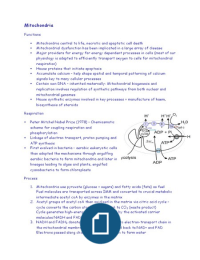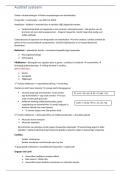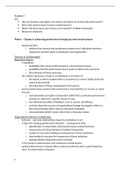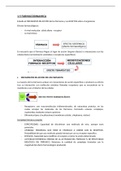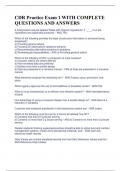International Trade Law
Readings 1: The WTO and its institutions
Van den Bossche & Zdouc, The law and policy of the World Trade
Organisation
Chapter 1: International Trade and the Law of the WTO
Introduction
SDGs international trade as a means of changing the world
with regard to six of the SDGs internaitnoal trade is mentioned
Economic Globalisation and International Trade
Emergence of the Global Economy
Patchwork of national economies replaced by a truly global
economy
The Concept of ‘Ecnomic Globalisation’
It is the gradual integration of national economies into a borderless
global economy free international trade and foreign direct
investment
Not entirely new, there were already enormous sums of money and
stacks of goods fowing between countries before WWI
Forces Driving Economic Globalisation
Two main forces:
o Technology makes it feasible
o Liberalisation makes it happen
Economic Globalisation Today
The process of economic globalisation is not irreversible needs
support from all nations
In recent years, the global trade ratio has remained constant or
decreased minimally however, the global production chain-
movement has surged
Facts and Figures on International Trade and Foreign Direct Investment
Most established nations do not have a high international trade
ratio when compared with developing nations
1
, More manufactured goods are being exported by developing
countries!
FDI has surged in recent years and has stayed at those levels ever
since
Changing Nature of International Trade in the Global Economy
Global Value Chains (GVCs) rules-based system and
technological innovations facilitate this (AirBus airplanes!)
More developing countries could join these GVCs because they are
easily accessible productivity, sophistication and diversifcation
of exports
TiVA-database shows that trade in services is increasingly
important for GVCs
A Blessing or a Curse?
US elections of 2016 focussed on working class and de-
globalisation to get the work force up and running again
(“Americanism”)
In the EU, there is a certain anxiety about the downsides to
globalisation and what it would do to the European nations
Stiglitz: vilifcation of international trade and globalisation should
not overlook the benefts it is important that when globalisation
is seen as a problem, domestic policies are there to ‘catch’ the
people that are most afected by the process
Free Trade versus Restricted Trade
Arguments for free trade
Comparative advantage will beneft all countries (perfect economic
model, imperfect reality) specialisation of countries in specifc
products (Smith & Ricardo)
Samuelson: mutually proftable division of labour and higher
standards of living
More liberal international trade does not immediately lead to
greater economic growth World Bank: not all countries have
integrated successfully, but those that did grew towards the rich
2
, countries WTO: focus on protecting those afected by
liberalisation to mitigate negative side-efects
International trade fosters friendly relationships between nation-
states
Arguments for restrictions on trade
Protection of a domestic industry from competition arising from
imported products/services inbuilt asymmetry in domestic
politics and lobbying groups
Infant industry protection industry is not yet ready to enter in the
world market and compete with already established industries in
developed countries, but success of the policy is dependent on good
assessment of which industries can become competitive over time
Strategic trade policy in order to ensure that a domestic
company establishes itself in the world market and can undercut
other companies under industry pressures
Generate revenue for government import duties and taxes form
an easy way to collect government money
National security/self-suficiency protection so that countries do
not become dependent on other countries and in case of confict are
stuck with nothing
Protection and promotion of other societal values most of the
time needed, sometimes protection in disguise
International Trade to the Beneft of All?
The international trade system needs to be managed well to lift
people out of poverty
Four-point agenda for action (Wolfensohn):
o Good governance at the national level;
o A further reduction of trade barriers;
o More development aid;
o Better international cooperation and global governance of
economic globalisation and international trade.
Two-sided question:
3
Readings 1: The WTO and its institutions
Van den Bossche & Zdouc, The law and policy of the World Trade
Organisation
Chapter 1: International Trade and the Law of the WTO
Introduction
SDGs international trade as a means of changing the world
with regard to six of the SDGs internaitnoal trade is mentioned
Economic Globalisation and International Trade
Emergence of the Global Economy
Patchwork of national economies replaced by a truly global
economy
The Concept of ‘Ecnomic Globalisation’
It is the gradual integration of national economies into a borderless
global economy free international trade and foreign direct
investment
Not entirely new, there were already enormous sums of money and
stacks of goods fowing between countries before WWI
Forces Driving Economic Globalisation
Two main forces:
o Technology makes it feasible
o Liberalisation makes it happen
Economic Globalisation Today
The process of economic globalisation is not irreversible needs
support from all nations
In recent years, the global trade ratio has remained constant or
decreased minimally however, the global production chain-
movement has surged
Facts and Figures on International Trade and Foreign Direct Investment
Most established nations do not have a high international trade
ratio when compared with developing nations
1
, More manufactured goods are being exported by developing
countries!
FDI has surged in recent years and has stayed at those levels ever
since
Changing Nature of International Trade in the Global Economy
Global Value Chains (GVCs) rules-based system and
technological innovations facilitate this (AirBus airplanes!)
More developing countries could join these GVCs because they are
easily accessible productivity, sophistication and diversifcation
of exports
TiVA-database shows that trade in services is increasingly
important for GVCs
A Blessing or a Curse?
US elections of 2016 focussed on working class and de-
globalisation to get the work force up and running again
(“Americanism”)
In the EU, there is a certain anxiety about the downsides to
globalisation and what it would do to the European nations
Stiglitz: vilifcation of international trade and globalisation should
not overlook the benefts it is important that when globalisation
is seen as a problem, domestic policies are there to ‘catch’ the
people that are most afected by the process
Free Trade versus Restricted Trade
Arguments for free trade
Comparative advantage will beneft all countries (perfect economic
model, imperfect reality) specialisation of countries in specifc
products (Smith & Ricardo)
Samuelson: mutually proftable division of labour and higher
standards of living
More liberal international trade does not immediately lead to
greater economic growth World Bank: not all countries have
integrated successfully, but those that did grew towards the rich
2
, countries WTO: focus on protecting those afected by
liberalisation to mitigate negative side-efects
International trade fosters friendly relationships between nation-
states
Arguments for restrictions on trade
Protection of a domestic industry from competition arising from
imported products/services inbuilt asymmetry in domestic
politics and lobbying groups
Infant industry protection industry is not yet ready to enter in the
world market and compete with already established industries in
developed countries, but success of the policy is dependent on good
assessment of which industries can become competitive over time
Strategic trade policy in order to ensure that a domestic
company establishes itself in the world market and can undercut
other companies under industry pressures
Generate revenue for government import duties and taxes form
an easy way to collect government money
National security/self-suficiency protection so that countries do
not become dependent on other countries and in case of confict are
stuck with nothing
Protection and promotion of other societal values most of the
time needed, sometimes protection in disguise
International Trade to the Beneft of All?
The international trade system needs to be managed well to lift
people out of poverty
Four-point agenda for action (Wolfensohn):
o Good governance at the national level;
o A further reduction of trade barriers;
o More development aid;
o Better international cooperation and global governance of
economic globalisation and international trade.
Two-sided question:
3


